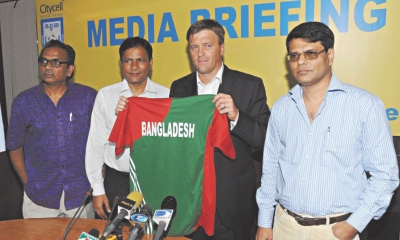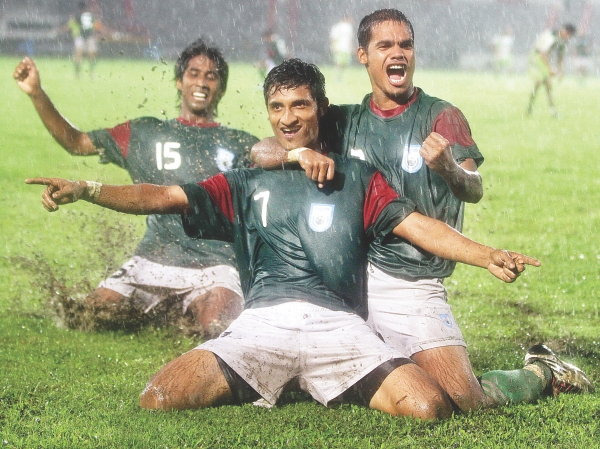| Home - Back Issues - The Team - Contact Us |
 |
| Volume 11 |Issue 10| March 09, 2012 | |
|
|
Sport The Runaway Coaches Naimul Karim
I t was the year 2000 and the Bangladeshi national football team was on its way to the Maldives to play an away fixture. Travelling with them was Mark Harrison, an English footballer who had been coaching the national team since April that year. According to their itinerary, the team had a long stopover in Sri Lanka and would have to wait for hours before boarding the connecting flight to the Maldives. Despite the expected halt, there were no hotel services arranged by the Bangladeshi Football Federation (BFF); the national players had to spend most of their time sleeping on the floor of the airport! Having witnessed the careless attitude of the BFF, Harrison, who was only in his sixth month as coach of the national side, returned to England as soon as the matches in the Maldives was over. Recalling the laborious journey, Aminul Haque, who was a member of the team, says, “Mark Harrison was baffled by the kind of treatment we received. He didn't expect a good performance from a bunch of players who weren't respected by their own federation.” The departure of Harrison is just one of the many dreaded examples that describe the pitiful conditions of the coaching scenario in the country. The last five years saw the BFF appoint 12 different coaches for the national side--a statistic that no footballing-nation in the world would be proud of. There was also an embarrassing instance when the BFF had named two coaches in a remarkably short span of nine days. While certain coaches were blamed for the national side's poor performance, others left due to disagreements with the federation. A prime example of the latter is the departure of Robert Rubcic who coached the national side from September 2010 to June 2011. Reports claim that Rubcic was not paid his monthly salary in time and therefore left without informing the BFF. It was also learnt that the Croatian had appealed to FIFA to get his unpaid wages. In a similar manner, the departure of the Brazilian national, Edson Silva Dido, in 2009 after a 10 month stint with the national team also raised eyebrows. Dido, who left just before the South Asian Football Federation Cup (SAFF Cup), was constantly criticised for discarding the veterans and selecting a young national side. His different approach was never appreciated by the local coaches and as a result Dido had to part ways with the BFF. He, however, had the last laugh after a youthful Indian side, comprising of players below 23, managed to win the SAFF Championship in 2009.
The focus on building a proper structure for the youth has never been a priority for the BFF. According to Saiful Bari Titu, former national coach, the lack of developed structures at the grassroots is one of the main reasons behind the constant changing of coaches. “It's not possible to create a good squad just by concentrating on the national team. A coach requires the list of players who will play in the national team in the coming 8 years. We need to make a list for the future. Instead, we go for readymade results. Foreign coaches will need a good football structure to support them or else they'll never stay,” explains Titu. He stressed on creating more development programmes that involve the youth and eventually help in building a good team in the future. “Even if the BFF can manage to bring a Jose Mourinho, he'll still say the same thing. Create a proper structure,” says Titu. Echoing Titu's sentiments, Aminul Haque talks about a proper 'rotation' system where the under -17s and under-23s can eventually replace the players in the national side. He, however, says that in order to execute such a system, a foreign coach should be given more than just a one-year contract. “A coach is not a magician. He can't just come and change everything. In my opinion a coach needs at least three years time, so that he can develop and design his own strategy,” says Haque. Furthermore, he says that a coach should be ably supported by the BFF. “The federation needs to make proper arrangements and provide facilities to the coach for him to handle everything properly. This doesn't always happen.” Stating an example, Haque says that national players go to training either by catching a rickshaw or by managing their own transport. “This may be a small matter but nevertheless has a negative effect on the coach's training schedule,” he says. Despite various calls to change the current system, the BFF seems content with their strategy of bringing a foreign coach right before an international tournament and letting him go after a short stint which may not even last for a year. A statement made by the BFF president, Kazi Salahuddin, perhaps best describes the federation's strategy: “A coach just organises his boys in a short time and it is a worldwide practice.” By the looks of it, the so called 'worldwide practice' isn't working out for the Bangladeshi national team. The recent debacle in the SAFF Championship, which eventually lead to the departure of another coach– Nikola Ilevski– who was perhaps one of the more experienced national coaches, are clear signs which shows the requirement for a change in the system. As the hunt for a coach is going on, one hopes that concerned officials can take a cue or two from Nepal's Graham Roberts, or India's former coach, Bob Houston while selecting the next foreign coach for the national side– both of them managed to improve the standards of football after being given longer runs by the respective countries. Copyright
(R) thedailystar.net 2012 |

